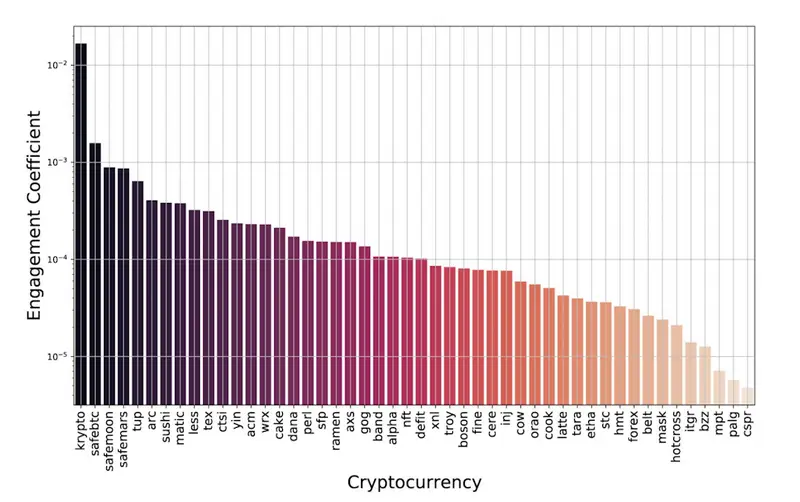Crypto returns are worse if Twitter bots drive engagement: Study
Crypto projects with more posts from Twitter bots tend to have lower returns over the long-term, according to a study from two Yale University academics.
The researchers examined more than one million tweets about 48 different cryptocurrencies created between 2019 and 2021. All had a fundraising goal of more than $1 million via token sales.
Their study focused on projects including axie infinity (AXS), cowswap (COW) and polygon (MATIC) leaving out bitcoin (BTC) and ether (ETH). All had a fundraising goal of more than $1 million via token sales.
A system to measure a so-called “engagement coefficient” quantified the level of interest and interaction displayed by social media users.
“Low engagement coefficients signal a lack of interest, while high engagement coefficients signal artificial activity which is likely from automated accounts known as bots,” Prof. Tauhid Zaman and PhD student Khizar Qureshi wrote in the paper.
“We found that the [engagement coefficient] was correlated with the future returns of the cryptocurrencies, and was most predictive of short-term returns.”
If a cryptocurrency has a very low engagement coefficient, it means that people aren’t really interacting with posts about it. This shows a lack of interest, which usually results in low returns over a long time horizon, the study said.
To predict future performance, the researchers devised an investment strategy that weighted portfolios based on bot activity and engagement coefficient. The latter appears to have a bigger influence, they found, especially over the first month of a token’s life.
The researchers noted that people can create a bunch of bots and make them engage with posts about a cryptocurrency to make it seem like there’s a lot of hype around it. This is what usually happens in pump-and-dump schemes, they said.
“These findings suggest that long-term returns are less dependent on social media features than short-term returns.”
Tracking viral crypto bots to trade better
As part of the analysis, the team looked at social media posts from the first month of each crypto’s existence.
Out of its chosen tokens, the researchers identified krypto as the cryptocurrency with the most buzz, a token used for in-game purchases in NFT battle game Kryptobellion.
At first, krypto had good returns, hitting as high as 49% after two months. But then things went downhill, and its returns turned negative. “This is likely due to bots programmed to like and retweet any tweets about krypto,” they said.
After 12 months, some cryptocurrencies had returns of over 2,000%, and the top dog was Axie Infinity’s AXS with returns of more than 24,500%.
“Overall, our results show that one can use social media activity to predict the future performance of cryptocurrencies over longer time horizons than previously known (months versus hours or days),” the researchers said.

They continued: “If it is truly the case that virality significantly drops after one month, investors can begin to exit their speculative positions, and potentially avoid the infamous ‘pump and dump.’ As their chosen cryptocurrency begins to lose engagement, their expected returns should be revised downward, which in turn should influence their investment decisions.”
Traders could even estimate engagement coefficients themselves using daily social media feeds for various cryptocurrencies to make short-term bets on the most “viral” tokens, the researchers posited.
There were concerns that the data could be skewed somewhat, considering some of the analysis covered a bull market when traders were more “risk-loving.” Still, the authors believe their social media engagement model is flexible, so it can work in all sorts of situations.
In the future, researchers could check if the model can predict other stuff like how well movies and TV shows do, sales of fashion items, who wins in political campaigns or even how cryptocurrencies with bigger market caps perform.
Comments
Post a Comment